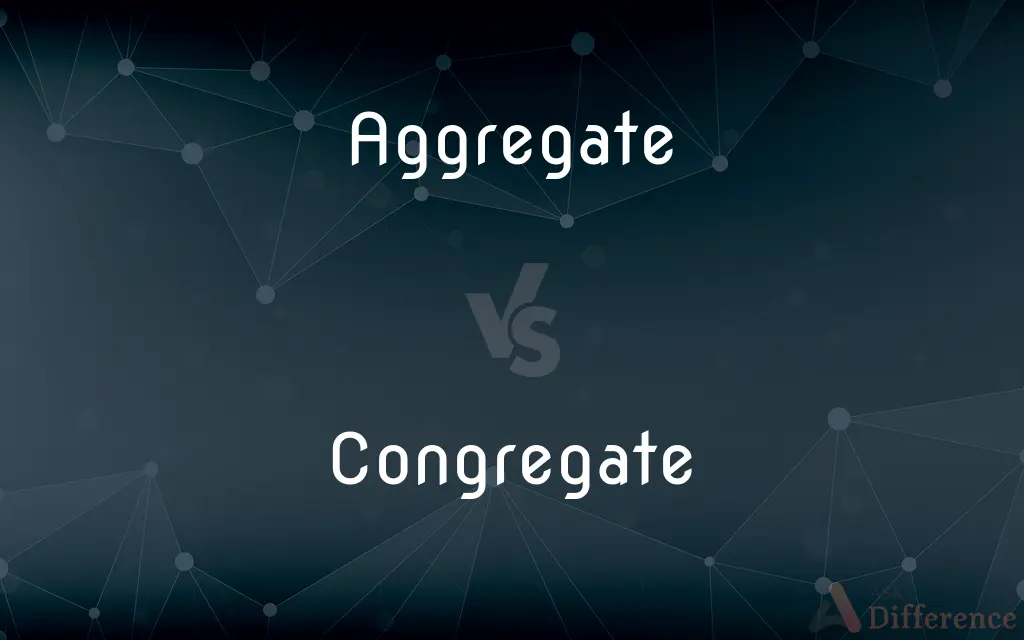Aggregate vs. Congregate — What's the Difference?
Edited by Tayyaba Rehman — By Urooj Arif — Updated on April 7, 2024
Aggregate refers to a total or sum formed by combining several elements, while congregate describes a group coming together or gathering in one place.

Difference Between Aggregate and Congregate
Table of Contents
ADVERTISEMENT
Key Differences
Aggregate is a term used to describe a total or sum that results from combining various individual elements, parts, or quantities. It emphasizes the collective amount or sum of these components without necessarily implying any interaction or unified organization among them. On the other hand, congregate is a verb that describes the action of individuals or entities coming together or gathering in a single location. It implies a degree of coordination or intentionality among the participants, who come together for a purpose, such as a meeting, social event, or religious service.
Aggregates are commonly used in statistics, construction, and data analysis to represent the total outcome or collective measurement of distinct items. For example, the aggregate score of a team could include the sum of points scored by all team members. Congregation, as a related noun, refers to the group of individuals who have come together in this way. The emphasis here is on the act of gathering and the formation of a group through physical proximity or a shared purpose.
While aggregate focuses on the outcome or total of combining several units, congregate focuses on the process of gathering or the state of being gathered together. In aggregate data, the individual components may lose their distinct identities as they become part of a total sum. In contrast, when individuals congregate, they maintain their individuality while also forming part of a collective group.
The concept of aggregation is essential in fields like economics, where it helps in understanding broader trends from individual data points, or in construction, where different materials are combined to form a composite whole. Conversely, understanding congregating behaviors is crucial in sociology and event planning, where the dynamics of group formation and interaction are of interest.
These differences highlight the distinct contexts in which each term is used: aggregate is more commonly associated with quantitative analysis and the combining of separate elements into a whole, while congregate relates to social or physical gatherings of people or animals.
ADVERTISEMENT
Comparison Chart
Definition
A total formed by combining several elements.
The act of gathering or coming together in one place.
Focus
Sum or total of components.
Process of gathering or state of being gathered.
Context
Often used in statistics, construction, data analysis.
Commonly used in social, religious, or meeting contexts.
Implication
Components lose distinct identities within the whole.
Individuals maintain individuality within the group.
Key Use
Understanding broader trends, combining materials.
Dynamics of group formation, interaction.
Compare with Definitions
Aggregate
Used in construction to describe combined materials like sand and gravel.
Concrete is made by mixing cement with aggregate such as sand and stone.
Congregate
To come together in a group or assembly.
The fans congregated outside the stadium to celebrate the team's victory.
Aggregate
In statistics, a combined measurement of distinct data points.
Researchers analyzed the aggregate data to observe overall trends.
Congregate
Describes people joining in a common location for a purpose.
Protesters congregated in the city center to voice their demands.
Aggregate
A whole formed by combining several distinct elements.
The aggregate demand in the economy reflects the total spending by all consumers.
Congregate
To accumulate in a particular location or area.
Dust and debris tend to congregate in corners and under furniture over time.
Aggregate
The total amount or sum of parts.
The aggregate score of the match was determined by adding up the points from all players.
Congregate
The action of gathering in one place.
Birds congregate near the lake during the migration season.
Aggregate
Pertaining to the collective, as opposed to the individual components.
The aggregate effect of the policy changes was positive for the economy.
Congregate
In a religious context, refers to the gathering of a congregation.
Every Sunday, the community congregates in the church for the morning service.
Aggregate
A whole formed by combining several separate elements
The council was an aggregate of three regional assemblies
Congregate
To bring or come together in a group, crowd, or assembly.
Aggregate
A material or structure formed from a mass of fragments or particles loosely compacted together
The specimen is an aggregate of rock and mineral fragments
Congregate
Involving a group
Congregate living facilities for senior citizens.
Aggregate
Formed or calculated by the combination of several separate elements; total
The aggregate amount of grants made
Congregate
(rare) Collective; assembled; compact.
Aggregate
Form or group into a class or cluster
Socio-occupational groups aggregate men sharing similar kinds of occupation
The butterflies aggregate in dense groups
Congregate
(transitive) To collect into an assembly or assemblage; to bring into one place, or into a united body.
Aggregate
Constituting or amounting to a whole; total
Aggregate sales in that market.
Congregate
(intransitive) To come together; to assemble; to meet.
Aggregate
(Botany) Crowded or massed into a dense cluster.
Congregate
Collected; compact; close.
Aggregate
Composed of a mixture of minerals separable by mechanical means.
Congregate
To collect into an assembly or assemblage; to assemble; to bring into one place, or into a united body; to gather together; to mass; to compact.
Any multitude of Christian men congregated may be termed by the name of a church.
Cold congregates all bodies.
The great receptacleOf congregated waters he called Seas.
Aggregate
A total considered with reference to its constituent parts; a gross amount
"An empire is the aggregate of many states under one common head" (Edmund Burke).
Congregate
To come together; to assemble; to meet.
Even there where merchants most do congregate.
Aggregate
The mineral materials, such as sand or stone, used in making concrete.
Congregate
Come together, usually for a purpose;
The crowds congregated in front of the Vatican on Christmas Eve
Aggregate
To gather into a mass, sum, or whole
Aggregated the donations into one bank account.
Congregate
Brought together into a group or crowd;
The accumulated letters in my office
Aggregate
To amount to; total
Revenues will aggregate more than one million dollars.
Aggregate
To collect (content from different sources on the internet) into one webpage or newsreader.
Aggregate
To come together or collect in a mass or whole
"Some [bacteria]aggregate so closely as to mimic a multicellular organism" (Gina Kolata). "The first stars began to form when hydrogen and helium gas left over from the Big Bang aggregated into dense clouds" (Paul Davies).
Aggregate
A mass, assemblage, or sum of particulars; something consisting of elements but considered as a whole.
Aggregate
A mass formed by the union of homogeneous particles; – in distinction from a compound, formed by the union of heterogeneous particles.
Aggregate
A set collection of objects.
Aggregate
(music) The full chromatic scale of twelve equal tempered pitches.
Aggregate
(sports) The total score in a set of games between teams or competitors, usually the combination of the home and away scores.
Aggregate
(roofing) Crushed stone, crushed slag or water-worn gravel used for surfacing a built-up roof system.
Aggregate
Solid particles of low aspect ratio added to a composite material, as distinguished from the matrix and any fibers or reinforcements; especially the gravel and sand added to concrete.
Aggregate
(Buddhism) Any of the five attributes that constitute the sentient being.
Aggregate
A mechanical mixture of more than one phase.
Aggregate
Formed by a collection of particulars into a whole mass or sum; collective; combined; added up.
Aggregate
Consisting or formed of smaller objects or parts.
Aggregate
Formed into clusters or groups of lobules.
Aggregate glands
Aggregate
(botany) Composed of several florets within a common involucre, as in the daisy; or of several carpels formed from one flower, as in the raspberry.
Aggregate
Having the several component parts adherent to each other only to such a degree as to be separable by mechanical means.
Aggregate
United into a common organized mass; said of certain compound animals.
Aggregate
(transitive) To bring together; to collect into a mass or sum.
The aggregated soil.
Aggregate
To add or unite (e.g. a person), to an association.
Aggregate
(transitive) To amount in the aggregate to.
There are ten loads, aggregating five hundred bushels.
Aggregate
To bring together; to collect into a mass or sum. "The aggregated soil."
Aggregate
To add or unite, as, a person, to an association.
It is many times hard to discern to which of the two sorts, the good or the bad, a man ought to be aggregated.
Aggregate
To amount in the aggregate to; as, ten loads, aggregating five hundred bushels.
Aggregate
Formed by a collection of particulars into a whole mass or sum; collective.
The aggregate testimony of many hundreds.
Aggregate
Formed into clusters or groups of lobules; as, aggregate glands.
Aggregate
Composed of several florets within a common involucre, as in the daisy; or of several carpels formed from one flower, as in the raspberry.
Aggregate
Having the several component parts adherent to each other only to such a degree as to be separable by mechanical means.
Aggregate
United into a common organized mass; - said of certain compound animals.
Aggregate
A mass, assemblage, or sum of particulars; as, a house is an aggregate of stone, brick, timber, etc.
Aggregate
A mass formed by the union of homogeneous particles; - in distinction from a compound, formed by the union of heterogeneous particles.
Aggregate
A sum total of many heterogenous things taken together
Aggregate
The whole amount
Aggregate
Amount in the aggregate to
Aggregate
Gather in a mass, sum, or whole
Aggregate
Gathered or tending to gather into a mass or whole;
Aggregate expenses include expenses of all divisions combined for the entire year
The aggregated amount of indebtedness
Aggregate
Formed of separate units in a cluster;
Raspberries are aggregate fruits
Common Curiosities
How does aggregation affect data analysis?
Aggregation can simplify complex data, making it easier to identify overall trends, but it may also obscure individual variations.
Why is congregating important for social events?
Congregating facilitates interaction, shared experiences, and the achievement of common goals, enhancing the social value of events.
What is the difference between aggregate and congregate?
Aggregate refers to a total or sum formed by combining elements, while congregate describes people or entities gathering together in one location.
Can inanimate objects congregate?
While inanimate objects can accumulate or be collected, "congregate" typically implies intentional action, making it more applicable to animate beings.
Can aggregation apply to qualitative data?
Aggregation is primarily quantitative, but qualitative data can be summarized or categorized in a way that serves a similar purpose.
What are examples of situations where people congregate?
Examples include religious services, protests, social gatherings, and public events.
How do individuals maintain their identity in a congregation?
Even within a congregation, individuals maintain their uniqueness through personal beliefs, actions, and the specific reasons they chose to gather.
How do businesses use aggregate data?
Businesses use aggregate data to analyze market trends, customer behavior, and overall performance, informing strategic decisions.
What challenges arise when trying to congregate in large numbers?
Large congregations can pose logistical challenges, including space limitations, safety concerns, and the need for effective communication.
Is it possible to have a virtual congregation?
Yes, people can congregate virtually through video calls, online forums, and virtual events, sharing a common purpose without physical proximity.
Can the concept of aggregation apply to emotions or experiences?
Conceptually, yes. People may speak of the aggregate impact of experiences or emotions when referring to their overall effect on well-being or perception.
How do aggregates contribute to environmental science?
In environmental science, aggregates of data help in understanding broad environmental trends and impacts, such as climate change.
What role do aggregates play in construction?
Aggregates are crucial in construction for creating composite materials like concrete, providing strength and stability.
Why might someone prefer individual action over congregating?
Preferences for individual action may stem from the desire for autonomy, the pursuit of personal goals, or discomfort with group dynamics.
How does technology facilitate congregating?
Technology enables easier coordination, communication, and participation in gatherings, even allowing for virtual congregations across distances.
Share Your Discovery

Previous Comparison
Mockingbird vs. Catbird
Next Comparison
Pavlova vs. VacherinAuthor Spotlight
Written by
Urooj ArifUrooj is a skilled content writer at Ask Difference, known for her exceptional ability to simplify complex topics into engaging and informative content. With a passion for research and a flair for clear, concise writing, she consistently delivers articles that resonate with our diverse audience.
Edited by
Tayyaba RehmanTayyaba Rehman is a distinguished writer, currently serving as a primary contributor to askdifference.com. As a researcher in semantics and etymology, Tayyaba's passion for the complexity of languages and their distinctions has found a perfect home on the platform. Tayyaba delves into the intricacies of language, distinguishing between commonly confused words and phrases, thereby providing clarity for readers worldwide.














































